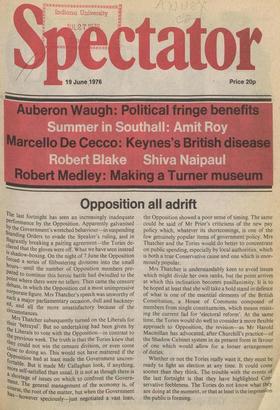Opposition all adrift
The last fortnight has seen an increasingly inadequate performance by the Opposition. Apparently galvanised _by the Government's wretched behaviour—in suspending Sjanding Orders to evade the Speaker's ruling, and in rlagraritly breaking a pairing agreement—the Tories deFlared that the gloves were off. What we have seen instead shadow-boxing. On the night of 7 June the Opposition lorced a series of filibustering divisions into the small ours—until the number of Opposition members prepared to continue this heroic battle had dwindled to the 13,oult where there were no tellers. Then came the censure clebate, in which the Opposition cut a most unimpressive corporate figure. Mrs Thatcher's speech was unworthy of such a major parliamentary occasion, dull and hackneyed. > and all the more unsatisfactory because of the circumstances. Mrs Thatcher subsequently turned on the Liberals for 1.,tleir 'betrayal'. But no undertaking had been given by ‘Lne Liberals to vote with the Opposition—in contrast to ti!le previous week. The truth is that the Tories knew that 11, cY could not win the censure division, or even come cr,u)se to doing so. This would not have mattered if the YPPosition had at least made the Government uncomlortable. But it made Mr Callaghan look, if anything, 111°re self-satisfied than usual. It is not as though there is anishortage of issues on which to confront the Govern ern. The general management of the economy is, of b°11rse, the root of the matter, but when the Government "a8---however speciously—just negotiated a vast loan, the Opposition showed a poor sense of timing. The same could be said of Mr Prior's criticisms of the new pay policy which, whatever its shortcomings, is one of the few genuinely popular items of government poiicy. Mrs Thatcher and the Tories would do better to concentrate on public spending, especially by local authorities, which is both a true Conservative cause and one which is enormously popular.
Mrs Thatcher is understandably keen to avoid issues which might divide her own ranks, but the point arrives at which this inclination becomes pusillanimity. It is to be hoped at least that she will take a bold stand in defence of what is one of the essential elements of the British Constitution, a House of Commons composed of members from single constituencies, which means resisting the current fad for 'electoral reform'. At the same time, the Tories would do well to consider a more flexible approach to Opposition, the revision—as Mr Harold Macmillan has advocated, after Churchill's practice—of the Shadow Cabinet system in its present form in favour of one which would allow for a looser arrangement of duties.
Whether or not the Tories really want it, they must be ready to fight an election at any time. It could come sooner than they think. The trouble with the events of the last fortnight is that they have highlighted Conservative feebleness. The Tories do not know what they are doing at the moment, or that at least is the impression the public is forming.


































